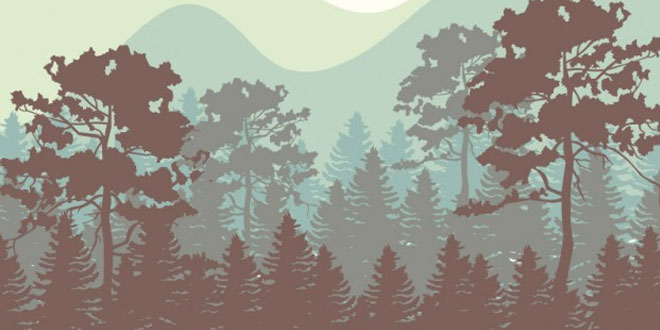Question: List five products we get from forests.
Answer: Five products are:
- We get medicines from forests.
- We get gum from forests.
- We get wood which is used for many purposes like making furniture, paper etc.
- We get food for animals from forests.
- We get sealing wax from forests.
Question: Explain why there would be the chances of increase in carbon dioxide with the decrease in number of forests?
Answer: The forest plays an important role in maintaining the balance between oxygen and carbon dioxide in the atmosphere. As we know plants for their food nutrition requirement make use of process of photosynthesis, in which they consume Carbon Dioxide, released by the living organism from the environment. As a result of photosynthesis, plants release oxygen which is again consumed by living beings for respiration and this cycle goes on.
Question: How water pollution will be affected with the depletion of forest?
Answer: Without tree roots holding the soil in a forest, soil will run into the river and will cause water pollution.
Question: Explain why there is a need of variety of animals and plants in a forest?
Answer: Animals and plants in a forest are dependent on the other for food. So there is a need of variety of animals and plants in a forest. Many food chains can be found in the forest like –
Grass→ insects→ frog→ snake→ eagle.
Question: Explain how forest affects our food chain.
Answer: Grass is eaten by insects, which in turn, is taken by the frog. The frog is consumed by snakes. This is said to form a food chain:
Grass→ insects→ frog→ snake→ eagle
Many food chains can be found in the forest. All food chains are linked. If anyone food chain is disturbed, it affects other food chains. These food chains produce a lot of supplementary products which are vital for the plants growth. The micro-organisms which convert the dead plants and animals to humus are known as decomposers.
Question: The micro-organisms called decomposers play an important role in the forest. Discuss.
Answer: The micro-organisms called decomposers play an important role in the forest. The presence of humus ensures that the nutrients of the dead plants and animals are released into the soil. From there, these nutrients are again absorbed by the roots of the living plants. The dead animals become food for vultures, crows, jackals and insects. In this way, the nutrients are cycled. So, nothing goes waste in a forest.
Question: Why should we worry about the conditions and issues related to forests far from us?
Answer: We should worry about the conditions and issues related to forests far from us because forests influence climate, water cycle and air quality of planet earth in a big way. Forests provide us with oxygen. If forests disappear, the amount of carbon dioxide in air will increase, resulting in the increase of earth’s temperature. They provide habitat to a large number of animals. In the absence of trees and plants, the animals will not get food and shelter. They protect soil. In the absence of trees, the soil will not hold water, which will cause floods. Forests help in bringing good rainfall in neighbouring areas. They are a source of medicinal plants, timber and many other useful products.
Question: Explain why there is a need of variety of animals and plants in a forest.
Answer: For a sustainable forest eco-system, there has to be variety of animals and plants in a forest. Forest is a system comprising various plants, animals and micro-organisms. The various components of the forest are interdependent on one another. In the forest, there is interaction between soil, water, air and living organisms.Different layers of vegetation provide food and shelter for animals, birds and insects. All animals, whether herbivores or carnivores, depend ultimately on plants for food.Organisms which feed on plants often get eaten by other organisms, and thus part of some food chain. Many food chains can be found in the forest. All food chains are linked. Some micro-organisms called decomposer, like mushroom (fungi), feed upon the dead plant and animal tissues and convert them into a dark coloured substance called humus. Humus enriches the soil with nutrition which helps in plants growth. The dead animals become food for vultures, crows, jackals and insects. By harbouring greater variety of plants, the forest provides greater opportunities for food and habitat for the herbivores. Larger number of herbivores means increased availability of food for a variety of carnivores. Not only is this, decaying heap of animal dropping a source of food to various insects or decomposers which ultimately enrich the soil with nutrition in the form of humus.
 Class Notes NCERT Solutions for CBSE Students
Class Notes NCERT Solutions for CBSE Students



